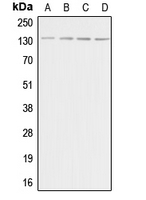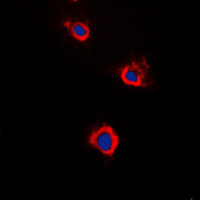Anti-Adenylate Cyclase 5/6 Antibody
- SPECIFICATION
- CITATIONS
- PROTOCOLS
- BACKGROUND

Application
| WB, IF |
|---|---|
| Primary Accession | O95622 |
| Other Accession | O43306 |
| Reactivity | Human, Mouse, Rat |
| Host | Rabbit |
| Clonality | Polyclonal |
| Calculated MW | 138908 Da |
| Gene ID | 111 |
|---|---|
| Other Names | ADCY5; Adenylate cyclase type 5; ATP pyrophosphate-lyase 5; Adenylate cyclase type V; Adenylyl cyclase 5; ADCY6; KIAA0422; Adenylate cyclase type 6; ATP pyrophosphate-lyase 6; Adenylate cyclase type VI; Adenylyl cyclase 6; Ca(2+)-inhibitable adenylyl cyclase |
| Target/Specificity | Recognizes endogenous levels of Adenylate Cyclase 5/6 protein. |
| Dilution | WB~~1/500 - 1/1000 IF~~1/50 - 1/200 |
| Format | Liquid in 0.42% Potassium phosphate, 0.87% Sodium chloride, pH 7.3, 30% glycerol, and 0.09% (W/V) sodium azide. |
| Storage | Store at -20 °C.Stable for 12 months from date of receipt |
| Name | ADCY5 |
|---|---|
| Function | Catalyzes the formation of the signaling molecule cAMP in response to G-protein signaling (PubMed:15385642, PubMed:24700542, PubMed:26206488). Mediates signaling downstream of ADRB1 (PubMed:24700542). Regulates the increase of free cytosolic Ca(2+) in response to increased blood glucose levels and contributes to the regulation of Ca(2+)-dependent insulin secretion (PubMed:24740569). |
| Cellular Location | Cell membrane; Multi-pass membrane protein. Cell projection, cilium {ECO:0000250|UniProtKB:P84309} |
| Tissue Location | Detected in pancreas islets (at protein level). Expressed in the brain, with high expression in the corpus striatum (PubMed:26085604). |

Thousands of laboratories across the world have published research that depended on the performance of antibodies from Abcepta to advance their research. Check out links to articles that cite our products in major peer-reviewed journals, organized by research category.
info@abcepta.com, and receive a free "I Love Antibodies" mug.
Provided below are standard protocols that you may find useful for product applications.
Background
Rabbit polyclonal antibody to Adenylate Cyclase 5/6
If you have used an Abcepta product and would like to share how it has performed, please click on the "Submit Review" button and provide the requested information. Our staff will examine and post your review and contact you if needed.
If you have any additional inquiries please email technical services at tech@abcepta.com.













 Foundational characteristics of cancer include proliferation, angiogenesis, migration, evasion of apoptosis, and cellular immortality. Find key markers for these cellular processes and antibodies to detect them.
Foundational characteristics of cancer include proliferation, angiogenesis, migration, evasion of apoptosis, and cellular immortality. Find key markers for these cellular processes and antibodies to detect them. The SUMOplot™ Analysis Program predicts and scores sumoylation sites in your protein. SUMOylation is a post-translational modification involved in various cellular processes, such as nuclear-cytosolic transport, transcriptional regulation, apoptosis, protein stability, response to stress, and progression through the cell cycle.
The SUMOplot™ Analysis Program predicts and scores sumoylation sites in your protein. SUMOylation is a post-translational modification involved in various cellular processes, such as nuclear-cytosolic transport, transcriptional regulation, apoptosis, protein stability, response to stress, and progression through the cell cycle. The Autophagy Receptor Motif Plotter predicts and scores autophagy receptor binding sites in your protein. Identifying proteins connected to this pathway is critical to understanding the role of autophagy in physiological as well as pathological processes such as development, differentiation, neurodegenerative diseases, stress, infection, and cancer.
The Autophagy Receptor Motif Plotter predicts and scores autophagy receptor binding sites in your protein. Identifying proteins connected to this pathway is critical to understanding the role of autophagy in physiological as well as pathological processes such as development, differentiation, neurodegenerative diseases, stress, infection, and cancer.



